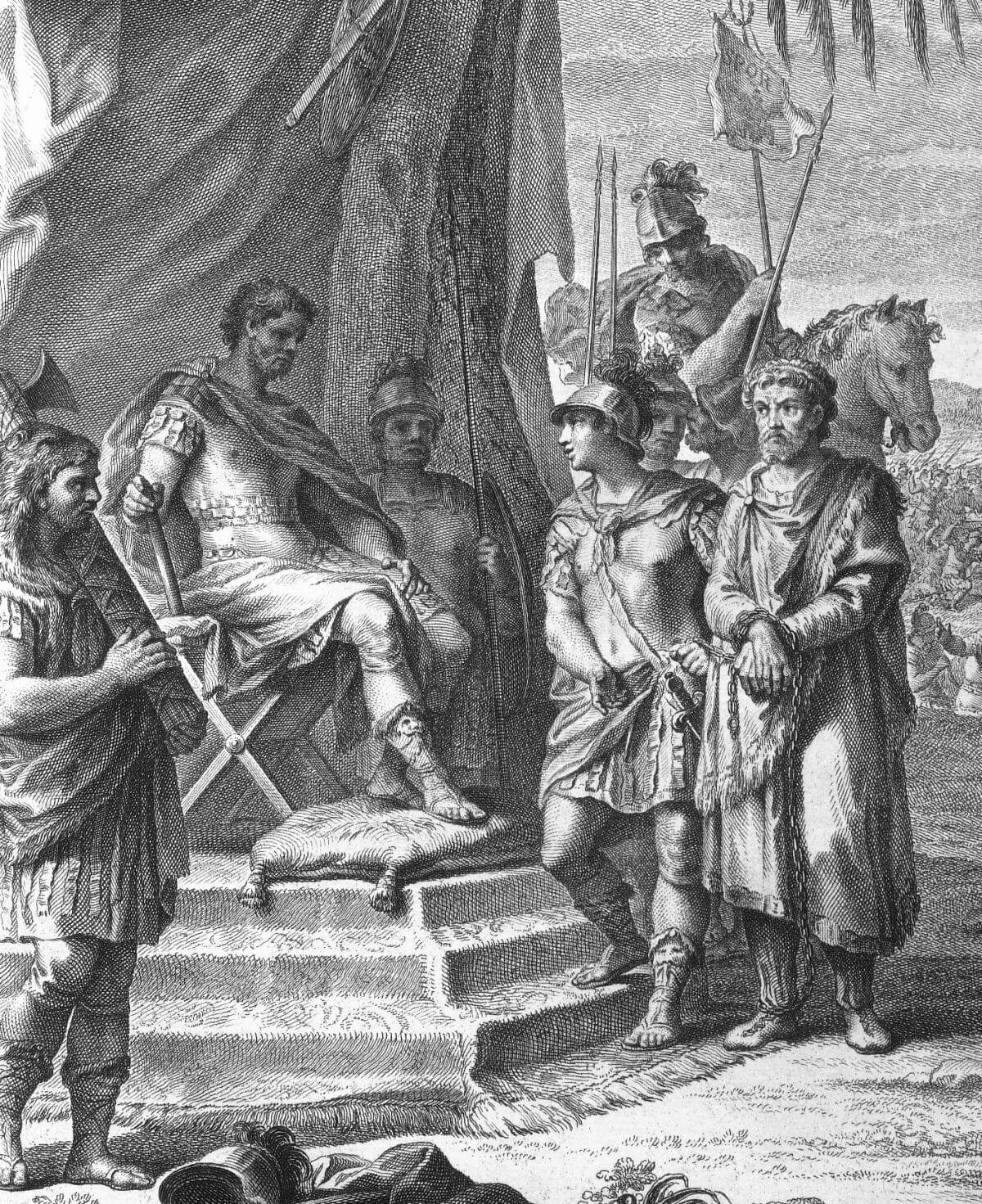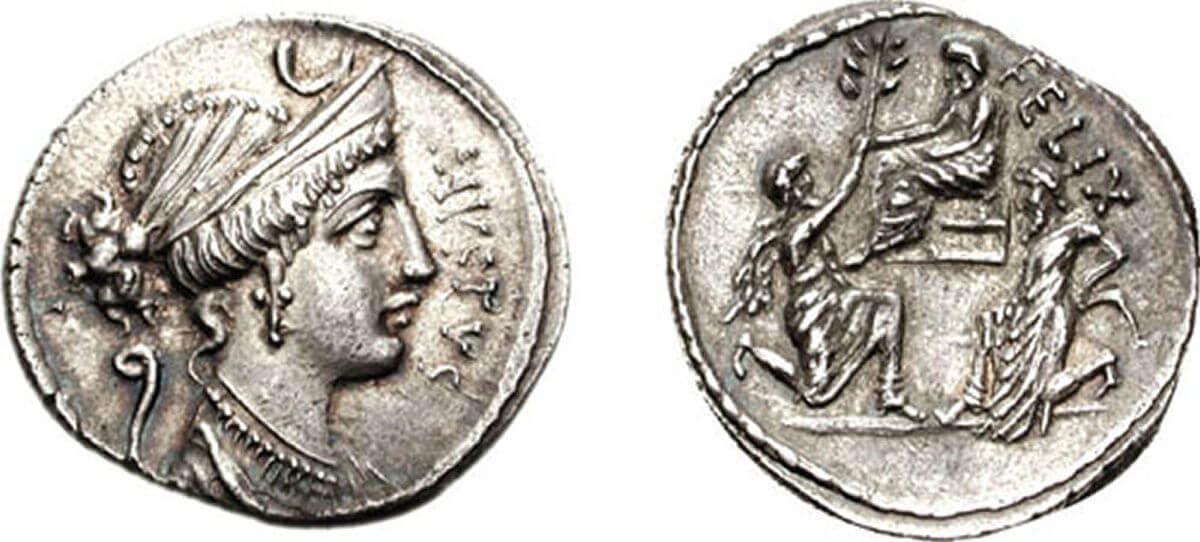After the destruction of Carthage, the most important kingdom in Africa was Numidia. It contained a number of flourishing towns which were centers of a considerable commerce.
Masinissa, the loyal Roman ally from the Punic Wars, left this kingdom to his son, Micipsa. The latter had two sons and a nephew, Jugurtha. Jugurtha was a brilliant and ambitious young man, who had served under Scipio in the Spanish Numantine war, and returned to Africa steeped in honors.
Gaining a deep knowledge of Roman military tactics and, due to his legionary service, a large number of friendly contacts within Rome and her Senate, Jugurtha was in a prime position to obtain power. He was named joint heir with his cousins to the kingdom of Numidia.
Micipsa died soon after, and Jugurtha took matters into his own hands, murdering one of his rival cousins, Hiempsal. He then claimed the whole kingdom of Numidia and launched an attack on his other cousin, Adherbal, who immediately appealed to Rome for help.

Jugurtha's Capture. Drawing by Gabriel de Borbon, Infante de España, 1772
Commissioners from Rome were sent to investigate, but Jugurtha cleverly used his influence with various Roman families, and large bribes, to secure support for his position. The envoys returned home without accomplishing anything, aside from a loose division of Numidia into two kingdoms between Jugurtha and Adherbal.
Jugurtha, however, pressed his advantage and moved against Adherbal anyway. A new delegation was sent to stop the attack but Jugurtha ignored it, and besieged Adherbal in his capital, Cirta.
Unfortunately for Jugurtha, Adherbal was heavily reliant on Italian residents of the African nation as the main part of his defense, and attacks causing harm to Romans and their allies would surely come to be noticed in Rome. Another Senatorial commission, this one headed by Marcus Aemilius Scaurus, summoned Jugurtha to stop the attack, but once again he pressed on.
In 112 BC, Adherbal was eventually forced to surrender, and he was savagely tortured to death. To make matters worse, Jugurtha not only defied Rome with his attack in the first place, but he put the surviving Italian defenders to the sword as well.
Due to Jugurtha's widespread political contacts and bribery, Rome was still slow to react. After much consternation, war was finally declared and Lucius Calpurnius Bestia, along with Marcus Aemilius Scaurus, led an army into Africa. Peace was quickly reached, however, with little damage to Jugurtha, and new allegations of scandal and bribery echoed throughout Rome.
One Tribune of the Plebs, Memmius, led the assault on those who may have been pocketing Numidian gold. He passed a law ordering one of the Praetors to bring Jugurtha directly to Rome to be interviewed, under a safe-conduct provision. Jugurtha, safe in his position - certainly in part due to pre-arranged political maneuvering - agreed to be brought before the Senate.
When he arrived, however, in essence to reveal those whom he had bribed, another Tribune vetoed the entire arrangement, rendering Jugurtha free to go without the necessity to name the men in his political pockets.
Clearly buoyed by the Roman political stalement, and feeling invulnerable to the corrupt Roman courts, Jugurtha arranged an assassination attempt on another cousin before returning to Africa. However, the assassins were caught and Jugurtha's involvement uncovered, further soiling his reputation, but Jugurtha had long since arrived back in his own country.
Rome reacted quickly this time and declared war once again. In 110 BC, Spurius Postumius Albinus led the attack, but was forced to leave his brother, Aulus, in command while he attended to personal matters.
Aulus, while laying siege to a Numidian town, was completely surprised and surrounded by Jugurthine forces. Apprantly targets of more bribery, the Romans were forced to surrender, and agreed to leave Numidia within ten days.
Back in Rome, the reaction was violent. Cries of scandal, bribery and incompetence were running rampant. Roman armies were losing to a petty client king without even shedding blood, while the commanders were coming home defeated but rich.
The common people, still angry with the Senate for its treatment of the Gracchi, were outraged by this complete lack of Senatorial capability. To top matters off, the Germanic Cimbri and Teutones were on the move in Illyria and southern Gaul, facing insufficient resistance from the Roman legions in their way.
In 109 BC, the Senate turned to an old family line of much prestige. The nephew of Metellus Macedonicus, conquerer of Macedonia, was sent to take the war to Jugurtha. Quintus Caecilius Metellus was a better general and a less corruptible Roman than his predecessors, but after two years in the field did little but to gain some minor victories.
Metellus' chief subordinate, Gaius Marius, a new man from Arpinum, was a brilliant and able young soldier. Frustrated by the lack of success under the command of Metellus, Marius decided to run for the Consulship himself.
A Plebeian hadn't been elected to the Consulship in well over a century, but the people were angry with the Senate, and looked to a new man to change the course of events. Running on a platform of opposition to 'optimate' corruption and failures, and despite many objections from the aristocrats, Marius was elected to the first of his seven eventual Consulships, in 107 BC.
With the election of Marius, Metellus was recalled, and given the honor of a triumph by the Senate (a completely politically-motivated event). Additionally, despite his complete lack of success, he was awarded the agnomen of Numidicus for "conquering" Numidia.
Marius, now free of the incompetence of his predecessor, set to work reorganizing and training his army. With losses to the Germanic tribes in Gaul and Illyria, Marius was forced to enlist volunteers from among the head count of Rome. He forever altered the political and military landscape, and paved the way for a professional, non-land owning army, in which the urban poor would have opportunities within the army.
Additionally, men of higher social rank but little wealth took the opportunity to join with Marius as well. One of these men, Lucius Cornelius Sulla, would prove to be Marius' greatest rival in later years, and one of the most famous names of the Late Roman Republic.
In less than two years, with near constant victories over a widely spread territory, Marius soon conquered all of the Numidian strongholds. Bocchus, King of Mauretania, and ally of Jugurtha, was growing ever more concerned over the impending approach of Marius and his army. Learning that the Romans were willing to negotiate to end the war, Sulla was sent to treat with the king.
A plot was hatched whereby Bocchus would betray his ally, Jugurtha, to the Romans in exchange for peaceful coexistence. Jugurtha was captured and handed over to Sulla, according to plan, who then took his captive to Marius. In 105 BC, the war was over and Marius was honored as victor due to his command, despite claims by Sulla to have been responsible for the capture. This event would mark the beginning of a long-standing rivalry between the two men that would end in violence and murder, many years later.

Classical Numismatic Group, Inc. http://www.cngcoins.com, CC BY-SA 3.0, via Wikimedia Commons
A silver Denarius coin from the Rome mint commemorating Sulla's capture of Jugurtha
Jugurtha, meanwhile, was sent to Rome to await his death during Marius' triumph. This triumph would be long delayed, however, as the Consul would be forced to save Rome from the serious threat of Germanic Cimbri and Teuton invasion.
The Late Roman Republic - Table of Contents
Did you know...
Masinissa was a tribal leader, and first he fought on the Carthaginian side in Spain, but from 206 BC he started to cooperate with the Romans, and assisted in the battle at Zama.



